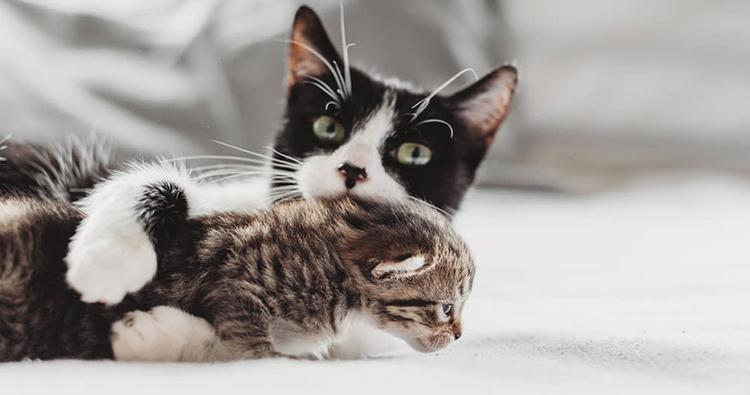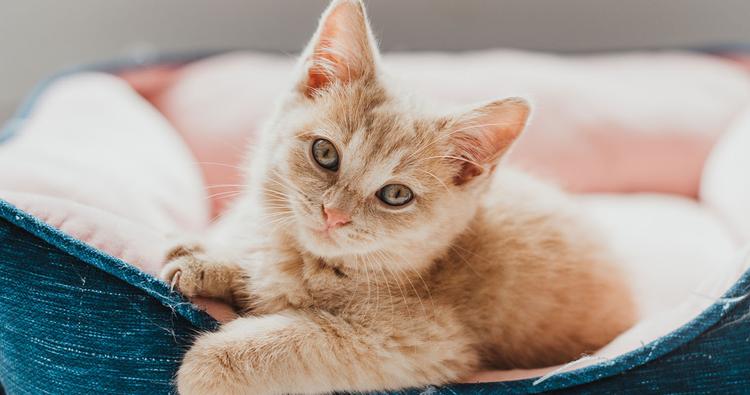How to Treat Worms in Kittens
Worms are common in cats, especially in kittens. Thankfully, freeing your feline from worms is not that difficult.
Worms are common in cats, especially in kittens. Thankfully, freeing your feline from worms is not that difficult.
by Adrienne A. Kruzer, BBA, RVT, LVT, | August 16, 2024

chendongshan / iStock
Kittens are cute. But worms? Not so much. Unfortunately, as many new pet parents will discover, there’s a decent chance your adorable new feline baby may come with worms. Having a kitten with worms can be concerning. But the good news? Worms are very treatable. Below, we cover everything you need to know about treating and preventing worms in cats.
The most effective approach involves a combination of veterinary-prescribed deworming medications and preventive measures tailored to the specific type of worm, your kitten’s age, and their overall health. This can only occur with insight from your veterinarian (even though there are some things you can do at home to help your kitten). Knowing the signs and symptoms to watch for — and learning what you can do to help prevent them from getting worms in the first place — is an important part of being a good pet parent.
Cats can pick up different types of worms, such as roundworms, hookworms, whipworms, tapeworms, and even heartworms. But roundworms are the most common intestinal parasite in cats.
Not sure if your kitten has worms? Well, depending on the type of worm, signs and symptoms might vary. If your kitten is experiencing any of the following symptoms, seek veterinary attention so you can get them the help they need.
A kitten can have intestinal parasites that aren’t visible to the naked eye. But if you do see white or off-white colored worms — most will look like pieces of spaghetti or rice in your kitten’s poop — this is a clear indication that worm treatment is needed.
If your kitten has a heavy burden of worms, they may throw up. Just like in the poop, you may see worms that look like spaghetti in your kitten’s vomitus. Any time a kitten is vomiting, it should be concerning, so even if they don’t have worms, you should let your veterinarian know.
It’s not uncommon for your kitten to have soft poop or diarrhea as well as a bloated belly and pale mucous membranes when they have worms. Worms disrupt your kitten’s normal microbiome, creating excess gas, damaging the intestines, and taking up space. So the poop consistency and shape of your kitten’s little belly may temporarily change. You may also see that your kitten has developed a poor coat of hair, has dry skin, and has experienced some weight loss or poor growth. This is because worms often steal a lot of the nutrition your kitten gets from their food.
Worms can cause your kitten to experience discomfort, pain, and even weakness. These symptoms are due to the space the worms are taking up in your kitten’s belly, the intestines they may be blocking, and the nutrition they are stealing from them. A kitten who isn’t active is usually a kitten who isn’t healthy. Additionally, if your cat is pooping outside of their litter box or overgrooming their hind end, they may be trying to tell you that something is wrong — and it may be an indication that they have worms.
Fecal testing is the best way to find out if your kitten has worms. You can bring a poop sample to your veterinarian to test by performing a fecal float, centrifugation, or direct smear to look for worm eggs and larvae under the microscope. These tests will determine whether or not your kitten has intestinal parasites.
Depending on your veterinarian and which intestinal parasites they suspect your kitten has, these tests may be performed in an animal hospital for immediate results, or be sent out to an external laboratory where it may take a few days for results. Another fecal testing method called an antigen test is available if your veterinarian suspects your kitten has giardia. This is a protozoan intestinal parasite that does not produce worms but can still be found in your kitten’s intestines and poop, causing issues.
There are a variety of kitten worm medicine options. Depending on the type of worms that your kitten has in their poop, they may require a special type of dewormer or a combination of dewormers, and specific dosing. How and when to deworm your kitten are questions your veterinarian will be able to answer once they know what kind of worms your kitten has and how much your kitten weighs.
Treating and preventing worms in kittens typically requires prescription medications. Your veterinarian may prescribe products containing emodepside, epsiprantel, eprinomectin, fenbendazole, ivermectin, milbemycin, moxidectin, selamectin, or other drugs to treat your kitten’s specific type of worms. These medications may need to be given once or several times to rid your kitten of worms.
Not all kitten worm medicines are prescription medicines. Praziquantel, piperazine, and pyrantel pamoate may be recommended by your veterinarian to treat your kitten’s worms. They do not require prescriptions, so they can be purchased over the counter from a pet retailer. These drugs do not treat all types of worms though, so before purchasing and giving your kitten any medicine, you should always discuss with your vet the best way to treat the specific types of worms that your kitten has.
Your cat or kitten will need to start a deworming routine based on your vet's recommended schedule. Due to the high prevalence of worms in kittens, dewormers are automatically given to new kittens to rid them of the expected worms in their bellies.
At your first vet visit, your veterinarian will examine your kitten for any abnormalities. They will discuss what you are feeding your kitten, detail what normal kitten behavior and growth looks like, recommend vaccines and preventatives, and give an initial deworming. This deworming is usually repeated every two weeks until your kitten is 16 weeks old, but this may depend on what kind of worms are common where you live. A poop sample will be tested to see if your kitten has any worms (even if they aren’t showing any symptoms of an infestation) and to ensure the correct dewormer is given.
If your kitten has completed their initial dewormings but you are still seeing worms in their poop or they are still testing positive for worms in a fecal test, follow-up treatments will be needed. The number and kind of treatments will depend on the kind of worms your kitten has.
While you can treat worms in kittens, it’s always best to keep your kitten from getting them in the first place. There are a variety of drugs (and combinations of drugs) available to prevent your kitten from getting worms and stop the spread to other cats. These drugs are typically given to your kitten each month in addition to, or combined with, heartworm, flea, and tick preventatives. Drugs used to prevent your kitten from getting worms include eprinomectin/praziquantel, ivermectin, milbemycin, milbemycin/praziquantel, moxidectin/fluralaner, moxidectin/imidacloprid, selamectin, and selamectin/sarolaner.
Tapeworms are passed to your kitten through flea bites: So if you can prevent fleas from biting your kitten, you can prevent tapeworms. Fleas are most commonly prevented through medications administered monthly. They are either absorbed through your kitten’s skin or given orally. Some flea-control products can even help prevent other parasites besides tapeworms.
If left untreated, worms can cause a variety of serious issues, below. If your kitten has worms, seek veterinary attention immediately.
Worms live in the intestines of your kitten where they prevent nutrients from being absorbed. The longer the worms live in the intestines, the longer these important nutrients are kept from your kitten. This can result in nutritional deficiencies and malnourishment in your kitten.
Kittens with heavy, untreated worm infections are less likely to develop normally and will be much smaller than kittens of the same age who do not have worms. The nutrients the worms steal from the intestines are important to your kitten’s development. This can lead to permanent negative implications.
As worms feed on the intestines of your kitten, they can damage the intestinal lining and cause internal bleeding. This blood may be seen in the poop, and if worms are left untreated and the bleeding continues, anemia can result. Additionally, other complications including dehydration and even death can result if a kitten’s worm burden is ignored for a long time.
Yes, intestinal parasites are zoonotic, so you can get worms from your kitten. Worms are not airborne, but some worms can be passed to people through the skin or by ingesting their microscopic eggs. It is always best to avoid touching your face and mouth, and to wash your hands thoroughly, after scooping your kitten’s litter box.
2021 AAHA/AAFP Feline Life Stage Guidelines
Gastrointestinal Parasites of Cats

Adrienne Kruzer is an accomplished veterinary technician and writer with over 15 years of hands-on experience caring for domestic and exotic animals.

Adoption Advice

Adoption Advice

Adoption Advice

Adoption Advice
Cat introduction process not going well? Here’s what might be causing the issues.

Behavior & Training
Cats aren’t bad, they’re just wild. Here’s how to satisfy their natural instincts without sacrificing your home — or sanity.

Adoption Advice
Adopting a new kitten? We've created a checklist to help you get organized before bringing your new friend home.

Adoption Advice
Thinking of adopting a cat? Learn more about the risks of single kitten syndrome before choosing an adopted friend.

Behavior & Training

Adoption Advice
The benefits and challenges of adopting an outdoor cat, plus tips to keep them happy and healthy